‘The Putin Interviews’: An Excerpt
Oliver Stone (right) conducted a series of meetings with Russian President Vladimir Putin for a documentary. Read an exclusive excerpt from the director's new film and book here.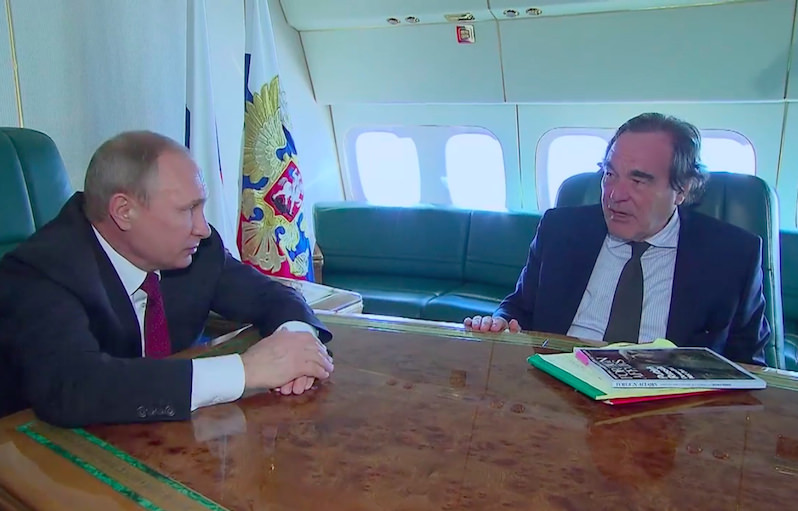 Vladimir Putin (left) and Oliver Stone in discussion during the filming of "The Putin Interviews." (Screen shot via Showtime)
Vladimir Putin (left) and Oliver Stone in discussion during the filming of "The Putin Interviews." (Screen shot via Showtime)
Vladimir Putin (left) and Oliver Stone in discussion during the filming of “The Putin Interviews.” (Screen shot via Showtime)
The following segment is excerpted from “The Putin Interviews,” a transcript of a series of discussions between filmmaker Oliver Stone and President Vladimir Putin conducted in Russia over nine days between July 2, 2015 and Feb. 10, 2017. The excerpt below is from the “Fourth Interview,” which took place on Feb. 10.
This excerpt is reprinted by arrangement with Skyhorse Publishing. Read Truthdig Editor in Chief Robert Scheer’s foreword to the book here. The book can be purchased at Amazon, Barnes & Noble and IndieBound.
On Syria and Defense
OS: Can we quickly get back—in the matter of Syria, it seems to have quieted down. The showing of Aleppo was much-played-up in the Western media as barbaric. And I’ve seen the RT reports from a different perspective about what was happening there in West Aleppo—a different sense of, where the US media was not reporting some of the atrocities that were happening in Aleppo.
VP: You know, this is all part of an information confrontation. Certainly the media are used. If they present lopsided information, they discredit themselves in the end. In any case, when a question arises inevitably, if people are taken hostage by terrorists does it mean that we have to stop fighting terrorists? Should we just give them a blank check to do whatever they please? The question always arises—is the source of this evil the ones who fight terrorists or the terrorists themselves? Just have a look—there has been much talk about the need to provide immediate humanitarian aid to Aleppo. Right now, Aleppo has been liberated of terrorists. And no one talks right now about the need to provide humanitarian aid to Aleppo, even though security and safety have been ensured there. Many partners of mine, my colleagues were telling me that they were willing, they were ready to provide that kind of humanitarian aid, but so far nothing has happened. There were always those who said that we would be in conflict with the Sunni world sooner or later. I think this is, to me, a provocation. Many in the Arab world, and in Turkey, they do understand what our intentions are. There are those who disagree with that. But our position is clear. Our goal is to support the legitimate authorities, to prevent a disintegration of the Syrian statehood, otherwise this territory is going to be yet another Libya or worse. Or another Somalia. Secondly, our goal is to fight terrorism. And this is no less important to us. Just as I said, according to our data, 4,500 people from Russia and around 5,000 citizens from Central Asian countries—the former Soviet republics—are fighting there. And our task is to prevent them from coming home. Nonetheless, it is with respect that we treat the concerns of our partners from Turkey and from the Arab countries. What did it result in? First, at the final stage of the fight for liberating Aleppo, this stage didn’t end with hostilities. No, it ended with separating the forces. And we helped part of the armed opposition to evacuate from Aleppo. And we were the ones to facilitate this process. We were the ones to organize all of that. But everyone just made it look like they didn’t see what was happening. Secondly there were talks that once Aleppo was liberated, ethnic or religious cleansings would take place there. Do you know what decision I took? I decided to dispatch a battalion of Russia military police to Aleppo, from the Northern Caucasus, mostly from the Chechen Republic and a number of other republics in the Northern Caucasus. Incidentally, all of them are Sunni.
 The Putin Interviews
Purchase in the Truthdig Bazaar
The Putin Interviews
Purchase in the Truthdig Bazaar
OS: [laughter] I see.
VP: And the local population gave them a very warm welcome. They see them as their protectors. Certainly we did that with the concern and with the support of President Assad. He said he was interested in fostering a dialogue between different religious groups. Do you know what it led to? I’m going to tell you something that no one is aware of so far, but probably they are going to learn that before your film appears. The representatives of the armed opposition in one of the suburbs of Aleppo asked us to increase the number of our military policemen. They want us to bring this number to a great number in the regions they control. A week ago I decided to dispatch another battalion of military police there. But this is not all there is to it. Together with our military police, a Mufti from the Chechen Republic has appeared there. He is also a Sunni. He talks to our military, to the local population. We’re not interested in adding fuel to this conflict. Quite the contrary, we are interested in fostering dialogue, so as to preserve the territorial integrity of this country which is a very complicated matter. I’m particularly concerned about what we are witnessing. We see some sort of a divide of different religious groups. People are moving from one part of Syria to another. These religious groups are isolating themselves and separating, and this is very dangerous because it might result in a split. But I’ve got to tell you that we are successful because we’ve got the direct support of the Turkish leadership, as well as the leadership of Iran. This is a very difficult matter and it’s not always easy to find consensus. But direct contacts are being upheld with the Iranian partners and the Turkish partners, and this is what gives us hope and that is why we achieve success. What you’ve said about Syria quieting down, that is true. Indeed, hostilities have all but ceased between the armed opposition and the armed forces of the government. But hostilities are still ongoing against Daesh, the Islamic State.
OS: What would you say is the result of the Russian military intervention—in a few words?
VP: I can sum that up very easily. First, we’ve stabilized the legitimate authorities. Secondly, we have achieved a reconciliation and we’ve managed to bring to one negotiating table both the Armed opposition and the government. And we’ve managed to foster a dialogue in a trilateral format which engages both Turkey and Iran. We need the support of the United States as well as the support of Saudi Arabia, Jordan, Egypt. We’re going to tread very cautiously. So that each step secures what has been achieved at the previous step instead of undermining it.
OS: Again, what was the distance between Damascus and Moscow. You told me once it was kilometers . . .
VP: Well I never counted. I think 3,000. 2,000 to Sochi, another thousand to Istanbul. 3,500 or 4,000 kilometers.
OS: Okay. And one quick question. I mean, I definitely get the feeling from what you said that Mr. Erdogan in Turkey feels that the US CIA was involved in the coup d’état against him recently.
VP: Did he tell you that?
OS: No. He said things that hinted at it—in that direction.
VP: I don’t know anything about that. But I can see the rationale behind what he said. Mr. Gülen, whom he suspects of organizing this coup d’état, is living in Pennsylvania and he’s lived there for more than nine years.
OS: And Mr. Erdogan never said anything to you, he never whispered . . . ?
VP: No, he told me that he suspected Gülen and his organization, his movement, of organizing that coup d’état. He has never told me anything about the role of the United States. But I can see his logic—you can guess it. If indeed Mr. Gülen had taken part in this coup d’état attempt—of which I have no idea—it would be very hard to imagine that at least the intelligence services of the US would be unaware of what was happening. That’s the first thing. Secondly, the Air Force stationed at the Incirlik Air Base has been active in this coup d’état attempt. And that is exactly the air base where the main part of the American Air Force that is stationed in Turkey is located. We are a little bit concerned. And why is that? The thing is, tactical nuclear weapons are deployed in Turkey, US nuclear weapons. And when such dramatic events occur, the question arises as to what might happen to the nuclear warheads.
OS: Well, if the army is loyal to Erdogan, then I’m not sure. A lot of them are involved with the United States.
VP: Well, probably you know better than I do.
OS: Well, he rounded up a lot of military people.
VP: You know, Mr. Erdogan was one step from being assassinated. He moved from the hotel where he was staying. Some of his security officers were staying there. And one of the Special Forces, a commando from the armed forces came to him, there was a clash with his security officers and his security officers were killed. I think we can say that if Erdogan had stayed there than he would have been assassinated. These are just bare facts from which I infer no conclusions whatsoever. But this is what happened. I do not want either to analyze or give an assessment to what he did afterwards. But we know the historical role that the armed forces have been playing in Turkey. They’ve been the grantor of a secular avenue of development in the country. We’ve got this Golden Rule which we stick to—we never interfere within the domestic affairs of any country.
READ: Oliver Stone Hopes ‘The Putin Interviews’ Can Ease U.S.-Russia Relations
OS: Not even the US election?
VP: No, never. It’s up to the people of the country.
OS: I believe you.
VP: You know, even earlier, sometimes half as a joke, half on a serious note, we were saying that the American Constitution was not perfect.
OS: The Electoral College.
VP: Yes, absolutely right. Because the elections are not that direct. There was this electoral college that you mentioned. But their response was always, “This is none of your business. We’re going to sort it out ourselves.” So we do not interfere, either within the domestic affairs of the US or any other country. We have not interfered in Turkey.
OS: How close were you to a war—the United States said to Syria you crossed the red line in 2013 and General Shoygu, your Defense Minister said the Syrians were about to launch a massive attack of 624 cruise missiles within 24 hours. And it probably would have ended the sovereignty of theSyrian state at that point, when Obama said they crossed a red line, and you were involved with that, in stopping that and in removing the gases, the chemical weapons from Syria. How close was it? And were you worried about a US strike on Damascus?
VP: Honestly, I don’t know—I think you’ve got to ask the Obama administration about that, about how close they were to the brink of war, to making that decision. Another decision finally was made, luckily.
OS: You were involved in it.
VP: Yes, I was, when the G20 Summit took place in St. Petersburg, President Obama and I, we talked about this topic. And we agreed to try to take steps to eliminate the remains of chemical weapons in Syria.
OS: You sound very casual. It doesn’t sound right. I mean, if Shoygu said 24 hours, you guys have to be worried about it. This is your ally.
VP: Well, it’s all about the subjunctive mood, so to speak. Be that as it may, both I and President Obama agreed to work together back then, and luckily our joint work resulted in success.
OS: Well, you make it sound casual, but weren’t you worried that your ally would disappear and maybe ISIS was going to get all the way to Damascus right then and there? Didn’t you see all the implications of this?VP: Yes, certainly we were concerned. And that’s why we talked about how we could address that matter with other means and we were successful in doing that.
OS: You seem very cool about it, but I would imagine in that time period it might have been much tenser.
VP: Look, what happened back then happened back then. And right now we have a very well-organized and well-performing system of air defense deployed there.
OS: Ah!
VP: —We have the S-400, with a range of more than 300 kilometers, S-3000, also with a range of 300. The DEBO system with a range of 60 kilometers. And there are other systems that are more efficient in the shorter range. So we’ve got a multi-tier plan for air defense. And there are also the ships stationed off the coast that all also have this system of air defense.
OS: So you could have prevented it?
VP: And the most sophisticated air defense systems with a range of 300 kilometers.
OS: Well that’s some conversation you’re having with Obama—you’re saying Russian weapons are going to shoot down US weapons and you’ll have an international crisis. It’ll be quite a situation. The Pentagon is going to go wild, no? You know, this is close to war.
VP: Back then, we didn’t have those missiles in Syria.
OS: Oh, I thought you did.
VP: Our missiles were not active in Syria back then.
OS: Well, you had a long-term alliance with them since the early 1970s?
VP: Yes, but we didn’t take any part in what was happening there. We were just providing medical and technical military assistance to them, financial assistance.
OS: So, in other words, if the Assad regime had been, let’s say, weakened, would Russia have come to help it against an ISIS move towards Damascus?
VP: This once again depends on the subjunctive mood, and it’s difficult to talk about, because it’s all about myriads of factors that have to be taken into account.
OS: Let’s talk about another war situation since we’re in the Situation Room. More recent. In the Crimea, when the referendum was coming up, the US destroyer Donald Cook was moving towards the Black Sea with Tomahawk missiles. Correct me if I’m wrong, but I saw a documentary . . . Well, first of all, NATO announced military drills in the Black Sea and the Russian naval commander was talking about how close—in this documentary—was talking about how close Russia came to using its missile system for coastal defense. The US ship Donald Cook was apparently coming right into the Black Sea when it made a U-turn and didn’t carry through its mission. It seems like it was similar to the Cuban Missile Crisis when the same thing happened, where a ship was coming towards the demarcation line and made a U-turn because it had been threatened by the US Navy back in 1962. So where were you at this time when this Donald Cook situation was happening and were you nervous about his?
VP: Remember how the Ukrainian crisis unfolded. [We’ve discussed it.] The three foreign ministers of European countries were acting as guarantors of an agreement between the opposition and President Yanukovych. Everyone agreed to that. President Yanukovych even agreed to hold early elections. At that time, at the initiative of the United States of America, they told us, ‘We ask you to prevent President Yanukovych from using the armed forces.’ And they promised in their term they were going to do everything for the opposition to clear the squares and the administrative buildings. We said, ‘Very well that is a good proposal. We are going to work on it.’ And as you, know President Yanukovych didn’t resort to the armed forces. But the very next day the coup d’état took place during the night. We didn’t have a telephone conversation, we didn’t get a call, we simply saw them [the Americans] actively support those who perpetrated the coup d’état. And we could only shrug our shoulders. Such conduct, the way the Americans acted, even among individuals is absolutely unacceptable. They should have at least told us afterwards that the situation had spun out of control. They should have told us that they would do everything to put them back on a constitutional track. No, they didn’t do that. They started to come up with lies saying that Yanukovych had fled. And they supported those who performed that coup d’état. How can we trust such partners?
OS: Question—is this when Victoria Nuland, the Undersecretary of State, had that conversation with the American ambassador and said, “Fuck the EU”?
VP: Well, it doesn’t matter, honestly. It was on February 21st. Or maybe the 20th. The coup d’état took place the next day. So now that Crimea has become a full fledged part of the Russian Federation, our attitude towards it changed drastically. If we see a threat to our territory, just as any other country, we will have to protect it by all means at our disposal. I wouldn’t draw an analogy with the Cuban Missile Crisis, because back then the world was on the brink of a nuclear apocalypse. Thankfully, the situation didn’t go as far this time, even though we did indeed deploy our most sophisticated, our cutting-edge systems, for coastal defense.
OS: But the Bastion is a big missile and the destroyer, the Donald Cook, has Tomahawk missiles.
VP: Yes, certainly—against such missiles as the ones we’ve deployed in Crimea—such a ship, destroyer as Donald Cook is simply defenseless.
OS: Yes, that’s probably why they turned around?
VP: I think this captain was smart and also a responsible person. This doesn’t mean he’s weak . . .
OS: No, no.
VP: —He simply understood what he was dealing with. He decided not to continue.
OS: But your commander had the authority to fire?
VP: Our commanders always have the authorization to use the necessary means for the defense of the Russian Federation.
OS: Still, it’s a big incident potentially.
VP: Yes, certainly. It would have been very bad.
OS: Were you notified?
VP: Yes, certainly. Where is that ship stationed usually—the Donald Cook? Where is the base?
OS: The Mediterranean, I presume.
VP: Yes. But I think that the mother port is somewhere in the United States—the place it’s registered. So, thousands and thousands of kilometers from. . . . And even if the port is somewhere in the Mediterranean, somewhere in Spain, it is still thousands of kilometers from the Black Sea. And we are determined to protect our territory.
OS: I understand. But were you available, were you—
VP: Who was trying to provoke whom? What was that destroyer doing so close to our land?
OS: I understand, but were you contacted at the time? In what timeframe did all of this take place, this challenge?
VP: I think it was real time. Once the destroyer was located and detected, they saw that there was a threat, and the ship itself saw that it was the target of the missile systems. I don’t know who the captain was. But he showed much restraint. I think he is a responsible man and a courageous officer to boot. I think it was the right decision that he made. He decided not to escalate the situation. It doesn’t at all mean that he would have been attacked by our missiles. But we had to show them that our coast was protected by the missile systems.OS: Was there a warning sent out to him?
VP: The captain sees right away that his ship has become the target of missile systems—there is special equipment. He has special equipment to detect such situations.
OS: And all of this takes place in two minutes, 30 minutes, 50 minutes?
VP: I don’t know—the experts can give you the answer. Seconds, mere seconds, I think.
OS: I mean, does this happen all the time? You sound very cool.
VP: It sometimes happens. And that’s why our American counterparts have suggested we should build a system for exchanging information about the aircraft that are flying over, so as to avoid any kind of incident. Because when an aircraft is targeted, is eradiated by another aircraft this is considered a serious incident.
OS: I’d say.
VP: And this is always a very serious incident.
OS: So there have been others—there have been other incidents we don’t know about?
VP: I don’t know. NATO aircraft are flying over the Baltic Sea without transponders—the systems that are used to identify them—and our aircraft have started to fly without our transponders as well. And once our aircraft have started to do that, there’s been so much ruckus saying that we do not use transponders, but when I publicly declared that the number of our flights is many-fold fewer than the number of NATO flights the ruckus has quieted down. The president of Finland has proposed that we should make a decision making it obligatory for everyone to use these transponders, to detect them, to identify and we suggested right away that this should be done, but our NATO partners have refused. You see we need a dialogue all the time, we do not need new provocations.
OS: I understand, it’s very scary. At that time, you made a strong speech, I thought, addressing NATO. You said, “This is our historic territory. These are Russian people. They are in danger now. We can’t leave them alone. It wasn’t us who staged the coup. It was done by nationalists and people with far-right views. You supported them, but where do you live—5,000 miles away. But we live here and it is our land. What do you want to fight for there? You don’t know, do you? But we do know. And we are ready for it.”
VP: Yes indeed we were brought to the brink, so to speak.
OS: To the brink—you admit to the brink?
VP: Yes, certainly. We had to respond somehow.
OS: Well, finally you’re admitting it.
VP: Yes, we were open to positive dialogue. We did everything to achieve a political settlement. But they had to give their support to this unconstitutional seizure of power. I still wonder why they had to do that. Incidentally, that was a first step to further destabilization of the country. And this happens still. So, first the power is seized and right now these forces that have seized power are trying to make those who disagree with that accept this as a fact. This is what is happening to the south and eastern part of Ukraine. Instead of engaging in a political dialogue, which is quite possible, that is what they’re doing.
OS: Well, you have to get your story out there. Your side of the story—not only on RT, but hopefully with some intelligence releases, some shots, some images that would tell the story. You have to tell this story, you have to somehow get your raw intelligence into the system.
VP: You see, that’s quite impossible, because this point of view that we present is ignored by the world media. And if it’s ignored, not on equal footing with the other perspectives, then almost no one hears it. So a narrative is being constructed of some evil Russia—
OS: —I wouldn’t give up on that, I wouldn’t give up. You have to fight back. And you’re doing a great job but more, better.
VP: I’ll bear that in mind, but I think this critique is justified.
OS: [teasing] No, Dmitry’s done a lousy job on that. [Putin’s press secretary and confidant]
VP: Well, this is not up to him. This is not the task he’s supposed to do.
OS: I know.
VP: His task is to provide information and support to my everyday functions. . . . It’s my job and I’m not doing a very good job of it.
OS: You’re doing a great job, but you work too hard—you’ve got to relax. I think you should take a vacation. Go to Palm Beach, relax, sit on the beach, play some golf, talk.
VP: I understand the hint. Well, I envy him.
On Sovereignty
OS: In closing, you inherited a Russian state that was collapsing at the end of the last century. You came to office accidentally and people were in great misery. There was no sense of a central power and the point is that I think Russia had to be rebuilt so that it wouldn’t collapse again. Mr. Gorbachev’s ideal of restructuring didn’t happen. The West, in a sense, supported disorder. A vision which, you said, Russia must never again embrace. Then you said sovereignty is the key. Sovereignty is the key. I believe you said one time that a state in order to exist and have sovereignty has, amongst its obligations, to pay the pensions of older people. Yes?
VP: Yes, certainly. In general, and especially right now, a country can only ensure its sovereignty if it secures a good economic growth rate—not just the economic growth rate, you’ve got to secure economic development. And in this sense, despite the good assessment you’ve given to my job, I think both myself and my colleagues could have done an even better job. Even though that would have been immensely hard, because we were always facing a dilemma. We had to choose between a bad decision and an even worse decision. But that happens all the time everywhere. You are always faced with a choice. And you’ve got to make it. Liberally-minded people think that we should have taken harsher, tougher measures. I thought that the harshness had to correlate to the standard of living to help people. We had to go stepby step in improving the lives of our people. Back then, in 2000, more than 40 percent of our citizens were living below the poverty line, the system of social security was in ruin, let alone the armed forces which all but ceased to exist. Separatism was holding sway. I’m not going to elaborate on that, but I’m going to say that the Russian constitution didn’t apply all throughout our territory and the Caucasus was seeing a war that was raging—a civil war, which was fueled by radical elements from abroad. And in the end that civil war degenerated into terrorism. The situation was very difficult. But the Russian people and all the peoples of Russia, they’ve got a very important quality and that is love for their own nation, for their country. The sense of danger, the sense of compassion as well as the willingness to make sacrifices for the interests of their country. And thanks to these qualities of the Russian people and other peoples of Russia, we have managed to get through that difficult period. But we cannot exploit these qualities endlessly. We want our people to have better lives. Liberal-minded economists say we should have economized more or we shouldn’t have increased the wages, the salaries, the pensions. But you see our people still have a very, very modest standard of living. I want rank and file citizens, families to see that our country is recovering. Anyhow, we are trying to pursue a very restrained, reserved economic policy.OS: Getting back to sovereignty.
VP: We are trying to use the revenues from oil and gas. We will save this money, but we try to spend what we get from other sectors. For us that is a very difficult task. As you can see we have increased the real income of our population by a magnitude of several times. Last year, because of high inflation, real income was reduced a little bit. But at the end of last year we saw a pickup of that real income. Last year we managed to reduce the inflation rate to a historical record low—it was 5.4 percent or so. Even though our target was 6.2 percent. And we’re going to target inflation and I do hope that we’ll be able to bring it down to four percent. We’ve got a relatively low unemployment rate at around 5.4 percent. In spite of all the political restrictions, we’ve managed to keep our reserves, to stabilize our economy. I’m confident that this year we’re going to witness more economic growth, albeit modest. Our monetary policy is very well-balanced. It’s being implemented by the Central Bank and by the government.
OS: You should thank Obama—sanctions were good for you.
VP: Our agricultural producers have to thank the Obama administration. Due to the measures we’ve introduced to counter the sanctions against us. These countermeasures are mostly related to closing our market to agricultural produce. And thanks to these measures, the agricultural producers have managed to increase annually their production by more than three percent. Last year we saw record crops of wheat and other grains. And I know you love Russia, so it gives me great pleasure to tell you that Russia ranks first in the world in terms of wheat export.
OS: I like bread—the black bread is my favorite.
VP: We used to buy grains and wheat.
OS: From Canada, yeah.
VP: Right now we produce less than the US or Canada or China. But these countries have larger consumption rates. And as far as per capita production is concerned, it’s very good.
OS: I believe you. Sovereignty is not just economic though. I just want to tell you a quick story—last night . . . I mean the Russian people have guts. And last night there was a TV series on television Channel 1, I think it was. I saw it—prime time, 8 p.m. It was about the Germans and the Russians. And it was a very interesting story. It was in Russian. I didn’t understand much. But I got a sense of it. In that story, the Russians again behaved very courageously, very courageous and were very good fighters, and outwitted the Nazis. And you know, TV stuff, but it was damn good. It was well-made. The actors were really terrific. It was kind of ugly in a way, but in a good way—gritty. Very impressed and I remembered when I was here during the Brezhnev era, when they used to show all the old black and white Soviet films on TV, I saw the same kind of movie where the Soviets were taking on the Nazis again. And I made the connection. This is 34 years later, and I say the Russian people have a certain quality of courage which manifests itself time and again and they never forget. And by watching these old movies and remembering the tradition, remembering history, you go a long way towards keeping that sovereignty.
VP: Yes. That is very important. But no less important than this rigid framework of tradition is to be willing to accept new things, novelties, and to advance.
OS: Like cyber warfare! I’m not going to bug you anymore. I’ve got my hands full, 25–30 hours to cut. No more questions! Promise. A handshake across the countries. I wish I wish I wish. You did a great job, you did a good job.
VP: [a warm handshake] If they’re going to beat you for this, you can come back here to Russia and we’ll help heal you.
OS: We’ll see. I’m proud of the film. You got to tell your side of the story and that’s all I can do.
VP: I don’t know if anyone is going to be interested in that.
OS: That’s also possible. Goodnight, Mr. Putin.
Your support matters…Independent journalism is under threat and overshadowed by heavily funded mainstream media.
You can help level the playing field. Become a member.
Your tax-deductible contribution keeps us digging beneath the headlines to give you thought-provoking, investigative reporting and analysis that unearths what's really happening- without compromise.
Give today to support our courageous, independent journalists.
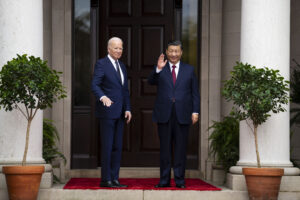
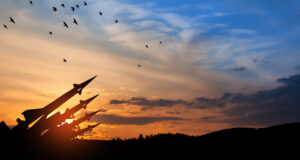
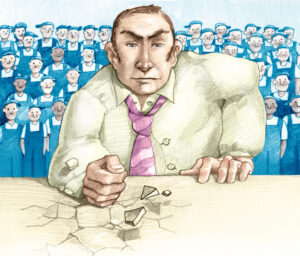
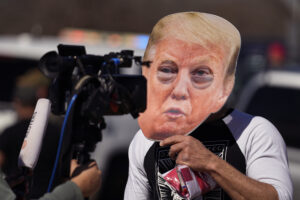
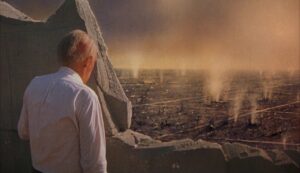

You need to be a supporter to comment.
There are currently no responses to this article.
Be the first to respond.